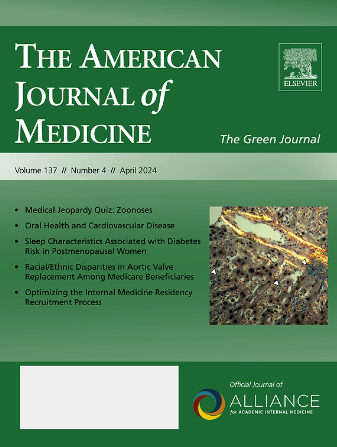心电图结果与慢性冠状动脉综合征患者临床预后的关系:ISCHEMIA 试验分析。
IF 5.3
3区 医学
Q1 MEDICINE, GENERAL & INTERNAL
引用次数: 0
摘要
目的:我们旨在研究心电图(ECG)结果与慢性冠状动脉综合征患者预后的关系:这项对 ISCHEMIA 和 ISCHEMIA-CKD 试验的二次分析将慢性冠状动脉综合征患者分为两组,即心电图描记正常组和心电图描记异常组。极化异常包括 ST 段压低≥0.5 毫米和 T 波倒置≥1 毫米;传导异常包括左束支阻滞和右束支阻滞(LBBB 和 RBBB)。主要终点是心血管死亡。结果采用协变量调整 Cox 回归模型进行评估:在 5876 例患者中,2901 例(49.4%)心电图描记正常,2975 例(50.6%)心电图描记异常。在中位随访 3.1 年 [IQR 2.1-4.2]期间,与正常心电图相比,基线异常心电图描记与心血管死亡风险增加有关(2975 例中的 257 例 [8.6%] 与 2901 例中的 97 例 [3.3%],调整后危险比 [aHR] 2.01,95%CI 1.58-2.55)。除黑色肤色患者和当前吸烟者外,其他亚组的这一发现是一致的,在这些患者中,心电图异常与心血管死亡风险的增加并无明显关联。个别心电图异常(ST段压低[aHR 2.0,95%CI 1.52-2.63]、T波倒置[aHR 1.89,95%CI 1.40-2.54]、LBBB[aHR 1.74,95%CI 1.05-2.90]和RBBB[aHR 1.52,95%CI 1.04-2.22])与心血管死亡风险的增加独立相关:结论:在慢性冠状动脉综合征患者中,异常心电图描记与心血管死亡风险增加有关。我们的发现强调了心电图在心血管风险分层和预后判断中的重要性:试验注册:NCT01471522,BioLINCC ID 14539。本文章由计算机程序翻译,如有差异,请以英文原文为准。
Association of Electrocardiogram Findings With Clinical Outcomes in Patients With Chronic Coronary Syndrome: An Analysis of the ISCHEMIA Trials
Objective
We aimed to investigate the association of electrocardiogram (ECG) findings with outcomes in patients with chronic coronary syndrome.
Methods
This secondary analysis of the ISCHEMIA and ISCHEMIA-CKD trials divided patients with chronic coronary syndrome into two groups, those with a normal ECG tracing and abnormal ECG tracing. Repolarization abnormalities included ST-segment depression ≥ 0.5 mm and T-wave inversion ≥ 1 mm; conduction abnormalities included left and right bundle branch block (LBBB and RBBB). The primary endpoint was cardiovascular death. Outcomes were assessed using a covariate-adjusted Cox-regression model.
Results
Of 5876 patients, 2901 (49.4%) had a normal and 2975 (50.6%) an abnormal ECG tracing. An abnormal ECG tracing at baseline, compared with a normal ECG tracing, was associated with an increased risk of cardiovascular death (257 of 2975 [8.6%] vs. 97 of 2901 [3.3%], adjusted hazard ratio [aHR] 2.01, 95% CI 1.58-2.55) over a median follow-up period of 3.1 years (IQR 2.1-4.2). This finding was consistent across subgroups except for patients with black skin color and current smokers, in whom an abnormal ECG was not significantly associated with increased risk of cardiovascular death. Individual ECG abnormalities (ST-segment depression [aHR 2.0, 95% CI 1.52-2.63], T-wave inversion [aHR 1.89, 95% CI 1.40-2.54], LBBB [aHR 1.74, 95% CI 1.05-2.90], and RBBB [aHR 1.52, 95% CI 1.04-2.22]) were independently associated with an increased risk of cardiovascular death.
Conclusion
In patients with chronic coronary syndrome, an abnormal ECG tracing was associated with an increased risk of cardiovascular death. Our findings underscore the importance of the ECG in cardiovascular risk stratification and prognostication.
Trial Registration
NCT01471522, BioLINCC ID 14539.
求助全文
通过发布文献求助,成功后即可免费获取论文全文。
去求助
来源期刊

American Journal of Medicine
医学-医学:内科
CiteScore
6.30
自引率
3.40%
发文量
449
审稿时长
9 days
期刊介绍:
The American Journal of Medicine - "The Green Journal" - publishes original clinical research of interest to physicians in internal medicine, both in academia and community-based practice. AJM is the official journal of the Alliance for Academic Internal Medicine, a prestigious group comprising internal medicine department chairs at more than 125 medical schools across the U.S. Each issue carries useful reviews as well as seminal articles of immediate interest to the practicing physician, including peer-reviewed, original scientific studies that have direct clinical significance and position papers on health care issues, medical education, and public policy.
 求助内容:
求助内容: 应助结果提醒方式:
应助结果提醒方式:


